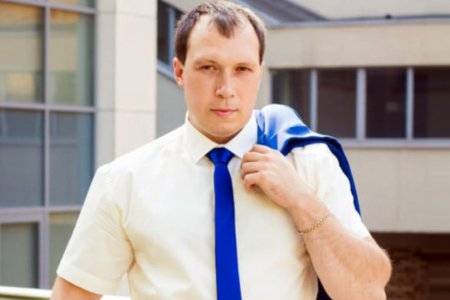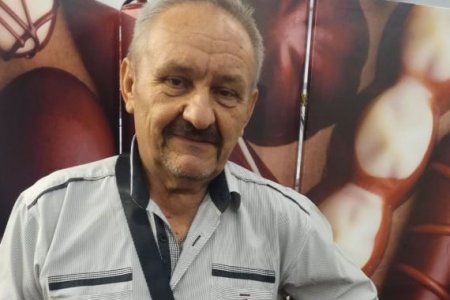
A Russian court has sentenced Oleksandr Korol to seven years’ imprisonment, with the size of the sentence indicating that the ‘judges’ were well aware of all of the reasons why Russia’s ‘trial’ of the Ukrainian, abducted back in 2017 from occupied Donetsk oblast, was so astoundingly illegal.
These sentences are partially for Russian state propaganda, and TASS reported on 13 August that the public prosecutor had demanded a 16-year sentence in a maximum-security prison colony. Some media were clearly surprised the following day, when the Southern District Military Court in Rostov handed down a significantly lower sentence, of seven years’ medium security prison colony. ‘Judges’ from this court have been churning out massive sentences against Ukrainians without any recognizable crime since 2014, and there are no grounds for suspecting presiding ‘judge’ Sergei Fedorovich Yarosh of concern about excessively punishing an innocent man. It seems much more likely that Yarosh knew what the reports do not acknowledge, namely that Korol had already been held in horrific conditions for almost seven years, with this making both the charges against him, and the fact that he was facing ‘trial’ in Russia so lawless.
Oleksandr Korol was seized in Makiivka in September 2017 when the city was part of the allegedly self-proclaimed ‘Donetsk people’s republic’ [‘DPR’]. Although the latter was, undoubtedly, created by heavily armed fighters, most of them Russian, and led by Russians Igor Girkin and Aleksandr Borodai, who took their orders from Moscow, Russia claimed that these were ‘separatists’ fighting a ‘civil war’. It had not officially recognized its proxy ‘republic’ until the eve of its full-scale invasion of Ukraine, and constantly denied any military or other involvement.
Yet in April 2024, it was learned that Korol was to go on ‘trial’ in Russia, charged under Russian legislation with ‘spying’ (Article 276 of Russia’s criminal code); and ‘involvement in a terrorist organization banned on the territory of the Russian Federation’ (Article 205.4 § 2). It was claimed that, as well as running his own construction business in occupied Makiivka, Korol had also drawn up maps of Russian military facilities. “According to our sources, he not only carried out surveillance of these, but also collected other secret information to pass on to Ukrainian Military Intelligence.”
Russia is, of course, an occupying power and as such is prohibited by international law from using its legislation against Ukrainian citizens seized on Ukrainian territory, and from imprisoning them in Russia. In this case, however, Russia is openly contradicting its own lies through its ‘trial’ of Oleksandr Korol and claiming ‘espionage’ to do so. ‘Spying’ charges are convenient for any of Russia’s numerous political trials of Ukrainians as everything, from the so-called ‘investigation’ to the ‘trial’ is shrouded in total secrecy. This includes all the methods of torture used to extract ‘confessions’ and, very often, to formally reject the services of an independent lawyer. Even where this does not work and the defendant does have a proper representative, the latter is invariably forced to sign a non-disclosure agreement and faces criminal prosecution if they reveal any details.
In this case, Russia is concealing not only the fact that the ‘espionage’ and ‘involvement in a terrorist organization’ charges are fictitious, but that the very charges are an effective admission that Russia was in charge of the proxy ‘republic’ from, at least, 2017.
Korol’s wife, Tetiana Lach has explained that the family left Makiivka after the city, which is not far from Donetsk, was made part of ‘DPR’. They simply returned from time to time to look after their home and ensure that it was not seized by the so-called ‘DPR authorities’.
It was during one of those trips to Makiivka, in September 2017, that Korol was taken prisoner. Tetiana received a call from an unknown number with the person saying he was ringing from the ‘DPR police’ temporary holding centre and told her to bring her husband new clothes, etc. The reason, she rapidly discovered, was that the clothes he had been wearing when seized were ripped and bloodstained.
The ‘DPR police’ initially claimed that he had been jailed under ‘administrative arrest’ for 30 days. When he was not released after that, Tetiana went to the ‘DPR police’ where she was basically abused, with her husband and her whole family ‘accused’ of pro-Ukrainian views and of not having taken part in the fake ‘referendum’ of 11 May 2014. This farcical event was so absurd that even Russia stopped short of ‘recognizing’ it, with people openly bribed to appear, and no impediment to ‘voting’ as many times as you wanted.
Tetiana recalls that these ‘DPR police’ told her that, in 2014-15, they had shot people like Korol, and that she should “thank them” for not shooting her husband or throwing him into some deep basement where he’d never be found.
Together with her mother and the couple’s 9-month-old daughter, she stayed in occupied Makiivka for three years, trying to get her husband released, or at least provide support so that he didn’t think he’d been abandoned. They were, however, finally forced to flee as she was given to understand that they could come for her also.
Seven years later, Russia decided to ‘try’ Korol under its legislation. Even were there any chance that the case is not based on ‘testimony’ tortured out of Korol or others, the charges would incriminate the aggressor state, not its Ukrainian civilian hostage.



